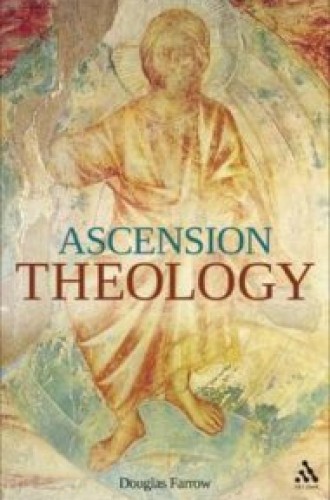Ascension Theology, by Douglas Farrow
A friend of mine, a professional scholar of the New Testament but no great fan of attempts (such as Rudolf Bultmann's) to "demythologize" its witness, recently told me about his visit to the Mount of Olives in Jerusalem. Standing there in the arid wind, the geography of the place adamantine, vivid and real to him for the first time, my friend felt the force of Bultmann's and others' efforts to translate some of the New Testament's events into conceptualities more readily accessible for us post-Enlightenment folk. "Jesus actually ascended? Right here from this rocky outcrop? Next thing I know, I'm supposed to believe he was wearing a cape and a superhero mask!" my friend joked.
Within the Chapel of the Ascension on the Mount of Olives, theologian Douglas Farrow writes in Ascension Theology, "one is directed to a footprint-like depression in the rock, said to be the exact point from which Christ parted from his disciples and from our world—as if he sprang into the heavens with such vigour that the very rock underneath his feet was compressed in the act!" For Farrow, it's precisely this absurdly material construal of the ascension—minus the mask and cape—that represents the real promise of the doctrine for theology and spirituality today.
Read our latest issue or browse back issues.
Farrow, a professor of Christian thought at McGill University in Montreal, is best known for his monograph Ascension and Ecclesia: On the Significance of the Doctrine of the Ascension for Ecclesiology and Christian Cosmology, a study that Princeton's Ellen Charry hailed as "nothing less than a theological breakthrough" when it appeared in 1999. In that book Farrow, then a Protestant in the Anglican fold, suggested that the patchy biblical record of the ascension—accounts of it are offered only in Luke 24:50–51 and Acts 1:6–11, while the theologies of Paul, John and Hebrews arguably assume some version of it—might yield more resources for Christian faith than one might think. Now, in the wake of his conversion to Catholicism, Farrow offers in Ascension Theology a more accessible version of the same argument, aimed at "the adventurous undergraduate, the seminarian and . . . the person in the pew."
What is the promise that Farrow discerns in the doctrine of the ascension? That it highlights and preserves the gospel's scandal of particularity. From the earliest beginnings of Christian reflection on the good news, the church has been tempted to treat the ascension as a welcome relief from the messy physicality of the incarnation. Origen and Augustine provide, for Farrow, prime examples of this approach. Arguably, they viewed the ascension as directing believers' gazes beyond the contingencies of history and toward the spiritual. Bultmann's search for the kernel of truth beneath the shell of the doctrine is simply the logical outcome of the Origenist and Augustinian perspectives.
On the other hand, the church has never lacked an Irenaeus—a dissenting voice for whom the very physicality of the ascension underwrites a robust, fleshy eucharistic theology and is thus essential to the proclamation of the good news. On such a reading, "the ascension is salvific, finishing what was begun in the baptism of Jesus, namely, the defeat of sin, the overthrow of Satan, the reconciliation of Israel to God, and the founding of a royal priesthood that is catholic in scope."
In the debate over the ascension's meaning, then, Farrow thinks that the stakes are high. At times this leads him to a curiously harsh polemic. Marginalizing the ascension is for him, it seems, the source of most of theology's ills. Ultimately, downplaying it goes hand in hand with a journey away from Rome toward Protestantism, issuing in the latter's rejection of transubstantiation and its disregard for a high Mariology. Readers inclined to agree with Farrow's basic position may balk at this stage of his argument. Is it really the case that Reformation theology offers "a presence without absence, a presence that deifies by eliding the distinction between the divine and the human"?
Even for readers more at home in Wittenberg and Geneva than Rome, it's hard to fault an argument that ends with a call for Christians to remember the incarnation and to enact that remembrance with and in their own bodies. "Where Christ is preached as ascended in the flesh," Farrow concludes, "it cannot be said that the flesh is unworthy of the upward call. And if it is worthy, or has been made worthy, then it follows that the flesh can neither be despised nor indulged, but must rather be disciplined and trained for glory." The ascension validates our bodily existence by honoring Jesus'. If he is not only risen from the dead but also exalted to his Father's right hand to enjoy a continuing enfleshment, then our human nature matters to God—indeed, it is taken into God's own life and thereby hallowed.
Might that sandal-sized depression in the Olivet rock, then, still be, "even for the new millennium, a symbol of that steadfast devotion to particularity—the particularity of the God of Israel and of Jesus the Christ—which arguably is the sine qua non of Christian religion?" After reading Farrow's book, one is inclined to say yes.






